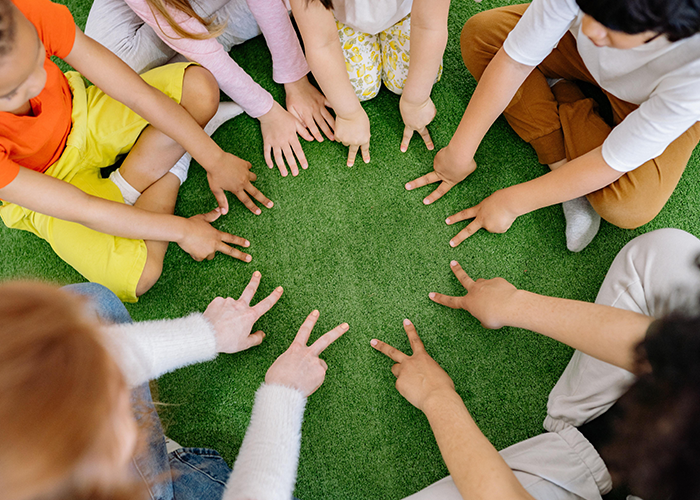Social play and sharing refers to joint interaction of peers during play. The interactions are essential to sharing of knowledge, as they provide opportunities to engage in role taking and social outlook. In addition, these activities will lead to co-operation and as a result make play a fun time too.
Social play is any type of play where children of the same age interact with each other. The play is structured (meaning there are rules to follow) and it may contain elements of pretend or imagination. Be it either two kids playing within their homes or a group of them playing indoors or outdoors, both will be referred to as social play.
Stages Of Social Play
Play is very important to all children and there are six stages to observe.
- Unoccupied play: This is where children are fairly still, and their play appears scattered.
- Solitary play: In this stage, the children play and entertain themselves. They don’t need any social involvement. They’re happy and focused on what they’re playing
- Onlooker play: Where the child observes others playing
- Parallel play: This type of play is where two or three children are playing together but not necessarily the same game
- Associative play: Is where they learn simple social skills from their peers
- Cooperative play: This play is fun as it could include making a den, making up a dance, a board game, or relay races.
What Are The Benefits Of Social Play?
Social play greatly improves your child’s social skills. In addition to this, it develops teamwork, and builds confidence.
What Are Examples Of Social Activities?
There are many social activities that involve imagination and the creation of different realities. Watching theatre or television, ball games, singing, painting, learning about arts and craft, travelling and sightseeing, and wildlife watching are all social activities and enjoyed by most children.
Ways To Encourage Sharing In Your Child
- Set limits up front: Let the kids take their turns. It is often hard to know when it’s time to give a favourite toy to their friend or sibling.
- Correct their behaviour when things go wrong in sharing.
- Praise the child for good behaviour.
- Talk about sharing toys with friends.
Benefits Of Sharing

Sharing their things with others helps in developing social skills in your child.
When you share things, it makes you more significant than you are. As much as you give others, even more do you receive back. Sharing is regarded as an essential social skill to build healthy, strong relationships and contribute to well-being and happiness.
Occasionally your child may refuse to share their essentials like toys or other stuff with other kids. Most parents have experienced such an embarrassing situation at some point of time. Trying to explain to your child that they should give up the item they were enjoying because another child is interested in it isn’t easy. But why do we actually do this? Here, the goal of teaching children to share comes in.
During the early formative years, children are learning how to meet their own needs. The concepts of sharing, lending, and borrowing are too hard for youngsters to understand. In addition, they’ve not yet developed understanding and cannot see things from another child’s perspective. Furthermore, if you try to force your little one to learn sharing habits, it might not serve the purpose. Instead, it shall turn them annoyed, resulting in their increased tantrums.
Learning To Share
Learning how to share is a huge milestone that takes a long time, however, with lots of varied games and activities that have sharing as the main focus, as well as the all-important praise and encouragement of sharing in play, your child will eventually be happy to share.
Top Sharing Activities For Preschoolers
You can try plenty of fun activities such as Feeding monsters, where is it? pass the smile, pass the parcel, rolling the ball, parachute switch, hide and seek, singing songs and taking turns, dancing, making sandcastles on the beach or in the sandpit.
To learn more such tips for preschool kids, you can also check our blog on ‘Tips To Prepare Your Child For Preschool.’
Tips To Promote Sharing In Everyday Routine
- Talk to your child about the benefits of sharing and other social skills.
- Set examples. This helps them to understand better.
- Whenever you notice your child sharing their things with others, make sure to praise your child enough.
- Play games as often as possible with your child which involve sharing and taking turns.






